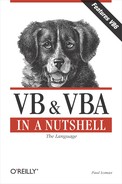| Switch Function |
Named Arguments
No
Syntax
Switch(expr-1, value-1[, expr-2, value-2 ... [, _
expr-n,value-n]])expr
Use: Required
Data Type: Variant
A number of expressions to be evaluated.
value
Use: Required
Data Type: Variant
An expression or value to return if the associated expression evaluates to True.
Return Value
A Variant value or expression.
Description
Evaluates a list of expressions and, on finding the first expression to evaluate to True, returns an associated value or expression.
Rules at a Glance
A minimum of two expression/value pairs is required; additional pairs are optional.
Expressions are evaluated from left to right.
If none of the expressions are True, the Switch function returns Null.
Although Switch returns only the first True expression's associated value, all expressions in the list are evaluated. This means that no performance gains result from placing expressions that are more likely to evaluate to True earlier in the list. It also means that any expression is capable of raising a run-time error.
value can be a constant, a variable, or an expression.
Example
The GetTextColor function uses the Switch function to return a color value that depends on the sign of the long integer passed to it as a parameter.
Private Function GetTextColor(lValue As Long) As Long
GetTextColor = Switch(lValue > 0, vbBlue, lValue = 0, _
vbBlack, lValue < 0, vbRed)
End FunctionProgramming Tips and Gotchas
The Switch function can prove to be an efficient alternative to If...Then...Else statements, but it can't be used in situations where multiple lines of code are required to be executed on finding the first True expression.
